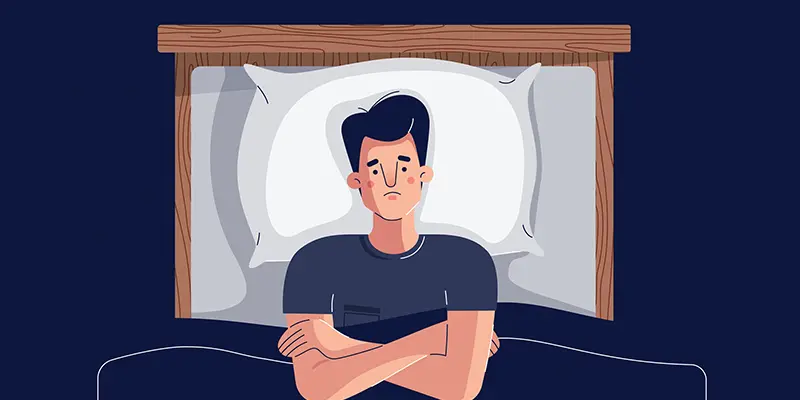
Sleepless nights—we’ve all had them. Whether you feel like you’re buzzing at night and can’t fall asleep, you toss and turn all night, or you wake up at 2 a.m. and can’t get back to sleep for hours, a lack of sleep can make you feel miserable. If you have chronic insomnia, which affects approximately 1 in 10 adults according to statistics, it’s even worse. Any form of sleep disorder can leave you with a bad mood, anxiety, and brain fog.
To get the quality sleep you need, you first have to find out what’s causing your sleep issues. Is it something related to your physical health? Is it due to emotional issues? For many people, sleep problems are connected to both biological issues and psychological conditions. Learn the most common physical and emotional sleep stealers so you can overcome them to sleep better.
For many people, sleep problems are connected to both biological issues and psychological conditions. Click To TweetPSYCHOLOGICAL CAUSES OF SLEEP PROBLEMS
Sleep issues are more common in people who have psychiatric disorders. Research shows that in more than 50% of cases, insomnia is linked to anxiety, depression, or stress. Some of the more common mental health conditions that are associated with sleep problems include the following:
Depression
Sleep problems are one of the symptoms of major depressive disorder. Depressed people may have trouble falling asleep or staying asleep, or they may feel overly fatigued during the day. Research shows that about 75% percent of people with depression also have insomnia. In some cases, they may sleep too much.
Anxiety
When you’re filled with fear, anxiousness, and worry, it’s no wonder it’s hard to get restful sleep. In fact, a 2020 study in Psychiatry Advisor shows that people with anxiety are 5 times more likely to have sleep disorders or insomnia.
Bipolar Disorder
Sleep disturbances are extremely common in people with bipolar disorder, a condition that is characterized by alternating periods of heightened moods and depressive symptoms. According to a 2016 study on the role of sleep in bipolar disorder, from 69% to 99% of people with the condition experience insomnia or feel a reduced need for sleep during manic episodes. During depressive episodes, disrupted sleep is more common as well as hypersomnia, which affects an estimated 38% to 78% of those with bipolar disorder.
ADD/ADHD
Having attention-deficit disorder (ADD), or attention-deficit hyperactivity disorder (ADHD) as it is more commonly called, increases the likelihood of experiencing sleep issues. Findings from a 2018 study show that 25% to 50% of people with the condition report troubled sleep.
BIOLOGICAL CAUSES OF SLEEP ISSUES
Numerous physical conditions can interfere with a good night’s rest. Some of the most common biological causes of sleep disturbances include the following:
Sleep Apnea
Affecting an estimated 22 million Americans, sleep apnea interrupts breathing for short periods throughout the night, robbing you of restful sleep and leaving you feeling fatigued, forgetful, and unfocused the following day.
Restless Leg Syndrome
One of the most common sleep and movement disorders, this condition causes uncomfortable feelings in the legs and an uncontrollable need to move them to calm those sensations. Affecting an estimated 5% to 10% of adults, this condition typically occurs while a person is at rest and becomes most severe at night during sleep. This makes it difficult to fall asleep and stay asleep.
Thyroid Imbalances
Having thyroid imbalances such as hypothyroidism, which affects about 5% of the US population, or hyperthyroidism, which affects about 1% of Americans, can cause sleep problems. A 2021 study shows that over 66% of people with hyperthyroidism have trouble falling asleep, and those with hypothyroidism have lower sleep duration.
Hormonal Issues
Low levels of progesterone, often seen in women during perimenopause and menopause, are associated with poor sleep. This is often attributed to the hot flashes and night sweats commonly experienced during this time of a woman’s life.
Congestive Heart Failure
Research shows that people with heart failure often experience sleep apnea, leg twitching, or orthopnea (paroxysmal nocturnal dyspnea), which is a shortness of breath that causes periodic awakenings during sleep.
Chronic Pain
When your body aches due to arthritis, headaches, or past injuries, it can lead to long-term sleep deprivation. Unfortunately, the lack of quality sleep increases pain susceptibility, creating a vicious cycle. An estimated 50% to 80% of people living with chronic pain suffer from some form of sleep disruption, according to the Psychiatric Times.
Dementia
Research shows that about 25% of people with dementia experience sleep issues. For example, people with Alzheimer’s disease “sundown,” or rev up at night and wander.
Acid Reflux
Gastroesophageal reflux disease (GERD), also known as acid reflux, affects an estimated 1 in 5 American adults and can interfere with sleep. Experiencing heartburn, indigestion, or vomit rising up in your throat can wake you during the night.
Enlarged Prostate Gland
Having an enlarged prostate gland, also known as benign prostatic hyperplasia, interrupts sleep due to an urgent need to use the restroom multiple times during the night.
Medications and Substances
Certain medications—including stimulants, beta-blockers, and nasal decongestants—and foods, such as caffeine, can contribute to sleep disturbances.
TREATING BIOLOGICAL AND PSYCHOLOGICAL CAUSES OF SLEEP PROBLEMS
To get more restful sleep, it’s important to address any underlying physical or psychiatric issues. Taking care of your overall health and well-being will enhance your sleep, which in turn, will improve your life.
Sleep disorders, as well as the mental health issues that contribute to them, can’t wait. At Amen Clinics, we’re here for you. We offer in-clinic brain scanning and appointments, as well as mental telehealth, clinical evaluations, and therapy for adults, teens, children, and couples. Find out more by speaking to a specialist today at 888-288-9834 or visit our contact page here.





“CHECK EVERYONE’s “ blood sugar level
Each time there’s restless legs, ck BLOOD SUGAR before bed & if waken with restless legs, also any signs of heart attack
Before driving or sleeping then TEST
wait just15 MORE minutes & test “again”
There are sooooo many people who dye of heart attacks BECAUSE NO ONE CKS BLOOD SUGAR FIRST……sudden chest pain can also be caused by sudden raise in BLOOD SUGAR
Comment by Susan Bigham-Lanning — April 4, 2022 @ 3:49 AM
I have depression , anxiety, enlarged prostate, sleep apnea,
I take Ambiem and cpap for sleep apnea . I take diazepam for anxiety. I don’t know if I am bipolar or not. I also have had a stroke 30 years ago and currently I am being treated for Afib and have had two cardio versions in last 5 years
Comment by Stephen — April 4, 2022 @ 4:02 AM
One of the reasons people with ADD have such a difficult time sleeping is because of the meds they are put on to function that keep them awake until very very late at night. All 3 of my nephews struggle with ADD, but one of them has an extreme case that has forced him to be on one of the highest doses of Vivance (sp?) which led to extreme weight loss and extreme insomnia. Also, my severe insomnia is personally from Lyme disease. Until I got sick, I never ever had insomnia of any kind. And unfortunately, I have to take a fist full of sleep meds to even sleep at night which cause me to be extremely drugged up the next day. I have no choice though because if I don’t get like 10-12 hours of sleep, I get much sicker and symptomatic with hellish Lyme symptoms.
Comment by Anne — April 4, 2022 @ 5:51 AM
What is the treatment for restless leg syndrome?
Comment by Catherine G — April 4, 2022 @ 10:37 AM
I struggled for a week with insomnia due to anxiety . But it went away ..hasn’t happened In four months . Just Happened last night again I’m definitely interested in learning more ways to tackle this . Because for me it became more of a trauma just in that week that I experienced insomnia
Comment by Beatriz Barragan — April 4, 2022 @ 12:21 PM
I have OCD. I’m seeing a psychiatrist and I’m on a cocktail of 3 meds. Also monitored by endocrinologist for thyroid and diabetes
The anxiety is better but I don’t want to do anything. Just sleep all day and night too sometimes. I’m thankful for less anxiety. That’s a blessing . I feel like I’m wasting my life.
Comment by Beverly Barrier — April 4, 2022 @ 1:00 PM
So what do we do? I’m sure mine is anxiety driven. I usually fall asleep just finem but wake up in the middle of the night and after I have laid there for an hour or more, I just finally get up. The first thing Dr’s say is a sleep study, but they sound awful and a lot of insurance companies don’t want to pay for them. Money is always an issue and probably makes people more stressed!
Comment by Gail McKelvey — April 4, 2022 @ 2:40 PM
Dr Amen, Far be it from me to sound patronizing when I say that you are unto Issues that are more precisely and finally addressed. My sleep is seriously affected by clenching, (difference vs. grinding *) so as to cause intense temporal pressure (so severe that it suppresses saliva production entirely during the night (waking up due to dry mouth) and as a result also affecting digestive and urinary tracs (!!) – This, my “opinion; but as this apparently has no medical name I may get little attention or even belief from my current GP regarding treatment – or that is , – if there is ANY.
Comment by Marie Michel — April 4, 2022 @ 3:33 PM
excellent information ….my issues is I have hypothyroid lower sleep duration…being tested this week for sleep apnea and am having a MRI to check brain and spinal cord…a serious accident when 5 yrs old a bail of hay fell on me while going of track to barn. I have issues retaining information since I started school where I noticed it but nothing was done even no I mention it to my parents and teachers for support and help. Need to find out what is really causing all my sleep issues, and memory issues. It is even harder as you get older…65 yrs old now.
Comment by Brenda Romaniuk — April 5, 2022 @ 2:29 AM
Anne, I too suffer severe sleep issues from chronic Lyme. I am practically allergic to all sleep meds Ive tried – oversedation at lowest possible doses. I cant take 1/4 mg melatonin for same reason. Im going for sleep study to determine if there is underlying sleep disorder. My guess is like all tests, it will come back normal but Im covering all the bases. Have had numerous heart, lung tests, MRI too. I suspect it is chronic fatigue (Slow Wave Sleep (SLS) issue)) as result of the damage Lyme has caused to bodily systems and re-activation of EBV. It is devastating knowing after 30 years majority of doctors only treat Lyme with antibiotics which has proven unsuccessful in 20% of the population…esp for those who were diagnosed years later…our voices are not heard.
Comment by Karen — April 5, 2022 @ 6:07 PM
excellent post!
Comment by Doug Morris — October 25, 2023 @ 5:15 PM